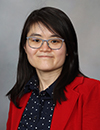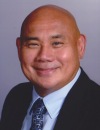Yupeng ChenAssociate Professor, University of Connecticut Dr. Yupeng Chen is an Associate Professor in the Department of Biomedical Engineering at University of Connecticut. He received his M.Sc. and Ph.D. in biomedical engineering and chemistry from Brown University. Dr. Chen has a long-term interest in designing and developing DNA-inspired Janus base nanomaterials for regenerative engineering applications. He is an inventor of 10 US patents and 14 international patents related to the Janus base nanotechnology. Some of these patents have been successfully licensed to industry. To date, Dr. Chen has published one book, nine book chapters and 63 peer-reviewed publications. He and his lab have delivered 107 conference presentations and invited talks. Dr. Chen is a recipient of the Faculty Early Career Development (CAREER) award from NSF, the discovery award from DOD and the grand prize of the New Investigator Recognition Awards from the Orthopaedic Research Society (top one winner among 545 worldwide candidates). Dr. Chen has been elected as a senior member of the National Academy of Inventors (NAI) as a recognition of his effort in translating scientific breakthroughs into real-life applications. Dr. Chen frequently serves as a reviewer on multiple NIH and NSF panels and conducts review and/or editorial work for 31 journals. Dr. Chen has received many competitive federal research grants from NIH, NSF, NASA, DOD and CASIS. Most recently, Dr. Chen has pushed the boundary of regenerative engineering research from Earth to space: Dr. Chen is funded to develop and evaluate Janus base nanomaterials on the International Space Station (ISS) for in-space tissue engineering, biofabrication, and biotherapeutics. |
Kristin KopperudScience Program Director, Biological Sciences, International Space Station National Laboratory Dr. Kristin Kopperud joined the Center for the Advancement of Science in Space, Inc. (CASIS), which manages the International Space Station (ISS) National Laboratory, as an Operations Project Manager in June 2020. She transitioned to the role of Science Program Director of Biological Sciences in the Research and Innovation department in March 2022. Her focus areas include tissue engineering, in-space production applications and biomanufacturing, and rodent research. In this role, she works with Principal Investigators to outline their science requirements during the early stages of their projects’ lifecycles. Using skills developed in her former role in the Operations department, she is able to evaluate concepts and proposals from an operational standpoint as well as a scientific one, which helps her to refine the projects’ requirements to feasibly support biology in microgravity. She also works with the Education department to use science as a means of education and outreach and presents to the public in webinars and conferences to connect to researchers in microgravity and beyond. |
Leanna LevineFounder & CEO, ALine, Inc. Dr. Levine, founder of ALine, Inc., is an entrepreneur, technologist, and inventor. She has a unique blend of technical expertise in both bioanalytical science and manufacturing process development. Prior to founding ALine, Dr. Levine developed bioanalytical technology to support life science research. While at Monsanto, her lab led the industry in the application of fluorescence polarization for high throughput screening for novel therapeutics. In 1998 she joined Spectrum Laboratories as Director of Hollow Fiber Manufacture and Product Development. Dr. Levine earned her Ph.D. at Washington University, St. Louis, MO , and her B.S. in Biochemistry and BA in German from the University of Missouri, Columbia, MO. In 2003 she was a visiting scholar at the UCLA Anderson School of Business. In 2000 she was the chair of the Gordon Conference on Bioanalytical Sensors. She is the co-author on a dozen publications, and several patents. |
Yuguang LiuAssistant Professor and Associate Consultant, Microbiome Program, Mayo Clinic Dr. Yuguang Liu is an Assistant Professor and Associate Consultant in the Department of Physiology and Biomedical Engineering and the Department of Immunology, as well as the Microbiome Program, Center for Individualized Medicine at Mayo Clinic. She is also affiliated with Trained as an electrical engineer, Yuguang Liu’s research interests focus on developing microfluidic technologies for various applications, from basic and translational research in medicine to the exploration of the limits of life on extraterrestrial bodies. She has expertise in developing microfluidic devices for studying the genomic adaption of single microbial cells under unusual environments, interaction between immune and microbial cells, rapid bacterial diagnosis and monitoring immune responsiveness to cancer immunotherapies. Yuguang Liu is also a recent awardee of Maximizing Investigators' Research Award (MIRA) R35 from the National Institute of General Medical Sciences. |
Molly MulliganDirector, Business Development, Redwire Dr. Molly Mulligan is director of business development at Redwire’s In Space Manufacturing and Operations business unit. In this role, she supports business development efforts for the company’s biotechnology and materials science portfolio. |
Michael RobertsChief Scientific Officer, International Space Station National Laboratory Michael S. Roberts, PhD is the Chief Scientific Officer of the International Space Station National Laboratory, managed by the Center for the Advancement of Science in Space, Inc. (CASIS). Before joining CASIS in 2013, Michael worked as a principal investigator and research group lead in the NASA Advanced Life Support program at the Kennedy Space Center. Prior to arriving at NASA-KSC in 1999, Michael completed an undergraduate degree in biology at Maryville College, a doctorate in microbiology at Wesleyan University and post-doctoral research at the Center for Microbial Ecology at Michigan State University and the RIKEN Institute in Wako-shi, Japan. |
Danilo TagleDirector, Office of Special Initiatives, National Center for Advancing Translational Sciences at the NIH (NCATS) Dan Tagle is Director of the Office of Special Initiatives at NCATS where he many coordinates efforts towards development of disruptive technologies in translational research. He obtained his Ph.D. in Molecular Biology and Genetics from Wayne State University School of Medicine. He was an NIH National Research Service Award postdoctoral fellow in Human Genetics at the University of Michigan. He has served on numerous committees, advisory boards, and editorial boards. He has authored many scientific publications and has garnered numerous awards, including more recently the Roscoe O. Brady Award for Innovation and Accomplishment, and the Henry J. Heimlich Award for Innovative Medicine. |




